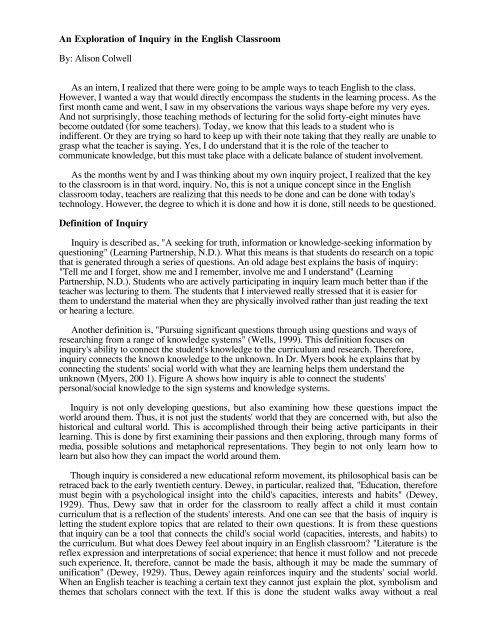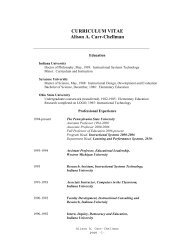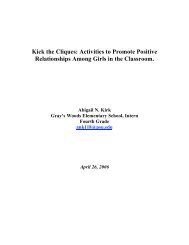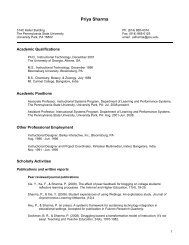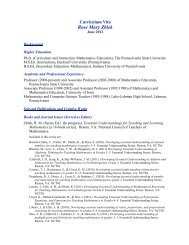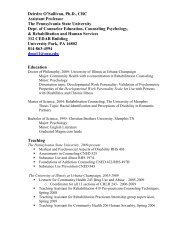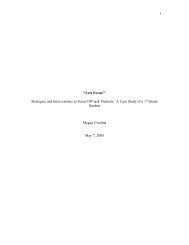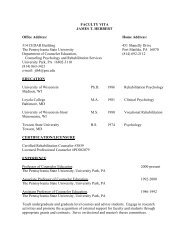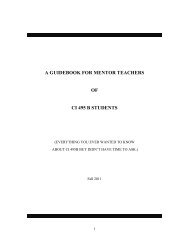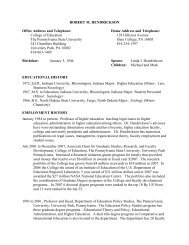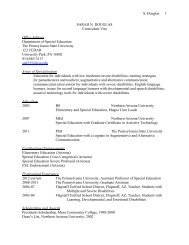An Exploration of Inquiry in the English Classroom By: Alison ...
An Exploration of Inquiry in the English Classroom By: Alison ...
An Exploration of Inquiry in the English Classroom By: Alison ...
You also want an ePaper? Increase the reach of your titles
YUMPU automatically turns print PDFs into web optimized ePapers that Google loves.
<strong>An</strong> <strong>Exploration</strong> <strong>of</strong> <strong>Inquiry</strong> <strong>in</strong> <strong>the</strong> <strong>English</strong> <strong>Classroom</strong><br />
<strong>By</strong>: <strong>Alison</strong> Colwell<br />
As an <strong>in</strong>tern, I realized that <strong>the</strong>re were go<strong>in</strong>g to be ample ways to teach <strong>English</strong> to <strong>the</strong> class.<br />
However, I wanted a way that would directly encompass <strong>the</strong> students <strong>in</strong> <strong>the</strong> learn<strong>in</strong>g process. As <strong>the</strong><br />
first month came and went, I saw <strong>in</strong> my observations <strong>the</strong> various ways shape before my very eyes.<br />
<strong>An</strong>d not surpris<strong>in</strong>gly, those teach<strong>in</strong>g methods <strong>of</strong> lectur<strong>in</strong>g for <strong>the</strong> solid forty-eight m<strong>in</strong>utes have<br />
become outdated (for some teachers). Today, we know that this leads to a student who is<br />
<strong>in</strong>different. Or <strong>the</strong>y are try<strong>in</strong>g so hard to keep up with <strong>the</strong>ir note tak<strong>in</strong>g that <strong>the</strong>y really are unable to<br />
grasp what <strong>the</strong> teacher is say<strong>in</strong>g. Yes, I do understand that it is <strong>the</strong> role <strong>of</strong> <strong>the</strong> teacher to<br />
communicate knowledge, but this must take place with a delicate balance <strong>of</strong> student <strong>in</strong>volvement.<br />
As <strong>the</strong> months went by and I was th<strong>in</strong>k<strong>in</strong>g about my own <strong>in</strong>quiry project, I realized that <strong>the</strong> key<br />
to <strong>the</strong> classroom is <strong>in</strong> that word, <strong>in</strong>quiry. No, this is not a unique concept s<strong>in</strong>ce <strong>in</strong> <strong>the</strong> <strong>English</strong><br />
classroom today, teachers are realiz<strong>in</strong>g that this needs to be done and can be done with today's<br />
technology. However, <strong>the</strong> degree to which it is done and how it is done, still needs to be questioned.<br />
Def<strong>in</strong>ition <strong>of</strong> <strong>Inquiry</strong><br />
<strong>Inquiry</strong> is described as, "A seek<strong>in</strong>g for truth, <strong>in</strong>formation or knowledge-seek<strong>in</strong>g <strong>in</strong>formation by<br />
question<strong>in</strong>g" (Learn<strong>in</strong>g Partnership, N.D.). What this means is that students do research on a topic<br />
that is generated through a series <strong>of</strong> questions. <strong>An</strong> old adage best expla<strong>in</strong>s <strong>the</strong> basis <strong>of</strong> <strong>in</strong>quiry:<br />
"Tell me and I forget, show me and I remember, <strong>in</strong>volve me and I understand" (Learn<strong>in</strong>g<br />
Partnership, N.D.). Students who are actively participat<strong>in</strong>g <strong>in</strong> <strong>in</strong>quiry learn much better than if <strong>the</strong><br />
teacher was lectur<strong>in</strong>g to <strong>the</strong>m. The students that I <strong>in</strong>terviewed really stressed that it is easier for<br />
<strong>the</strong>m to understand <strong>the</strong> material when <strong>the</strong>y are physically <strong>in</strong>volved ra<strong>the</strong>r than just read<strong>in</strong>g <strong>the</strong> text<br />
or hear<strong>in</strong>g a lecture.<br />
<strong>An</strong>o<strong>the</strong>r def<strong>in</strong>ition is, "Pursu<strong>in</strong>g significant questions through us<strong>in</strong>g questions and ways <strong>of</strong><br />
research<strong>in</strong>g from a range <strong>of</strong> knowledge systems" (Wells, 1999). This def<strong>in</strong>ition focuses on<br />
<strong>in</strong>quiry's ability to connect <strong>the</strong> student's knowledge to <strong>the</strong> curriculum and research. Therefore,<br />
<strong>in</strong>quiry connects <strong>the</strong> known knowledge to <strong>the</strong> unknown. In Dr. Myers book he expla<strong>in</strong>s that by<br />
connect<strong>in</strong>g <strong>the</strong> students' social world with what <strong>the</strong>y are learn<strong>in</strong>g helps <strong>the</strong>m understand <strong>the</strong><br />
unknown (Myers, 200 1). Figure A shows how <strong>in</strong>quiry is able to connect <strong>the</strong> students'<br />
personal/social knowledge to <strong>the</strong> sign systems and knowledge systems.<br />
<strong>Inquiry</strong> is not only develop<strong>in</strong>g questions, but also exam<strong>in</strong><strong>in</strong>g how <strong>the</strong>se questions impact <strong>the</strong><br />
world around <strong>the</strong>m. Thus, it is not just <strong>the</strong> students' world that <strong>the</strong>y are concerned with, but also <strong>the</strong><br />
historical and cultural world. This is accomplished through <strong>the</strong>ir be<strong>in</strong>g active participants <strong>in</strong> <strong>the</strong>ir<br />
learn<strong>in</strong>g. This is done by first exam<strong>in</strong><strong>in</strong>g <strong>the</strong>ir passions and <strong>the</strong>n explor<strong>in</strong>g, through many forms <strong>of</strong><br />
media, possible solutions and metaphorical representations. They beg<strong>in</strong> to not only learn how to<br />
learn but also how <strong>the</strong>y can impact <strong>the</strong> world around <strong>the</strong>m.<br />
Though <strong>in</strong>quiry is considered a new educational reform movement, its philosophical basis can be<br />
retraced back to <strong>the</strong> early twentieth century. Dewey, <strong>in</strong> particular, realized that, "Education, <strong>the</strong>refore<br />
must beg<strong>in</strong> with a psychological <strong>in</strong>sight <strong>in</strong>to <strong>the</strong> child's capacities, <strong>in</strong>terests and habits" (Dewey,<br />
1929). Thus, Dewy saw that <strong>in</strong> order for <strong>the</strong> classroom to really affect a child it must conta<strong>in</strong><br />
curriculum that is a reflection <strong>of</strong> <strong>the</strong> students' <strong>in</strong>terests. <strong>An</strong>d one can see that <strong>the</strong> basis <strong>of</strong> <strong>in</strong>quiry is<br />
lett<strong>in</strong>g <strong>the</strong> student explore topics that are related to <strong>the</strong>ir own questions. It is from <strong>the</strong>se questions<br />
that <strong>in</strong>quiry can be a tool that connects <strong>the</strong> child's social world (capacities, <strong>in</strong>terests, and habits) to<br />
<strong>the</strong> curriculum. But what does Dewey feel about <strong>in</strong>quiry <strong>in</strong> an <strong>English</strong> classroom? "Literature is <strong>the</strong><br />
reflex expression and <strong>in</strong>terpretations <strong>of</strong> social experience; that hence it must follow and not precede<br />
such experience. It, <strong>the</strong>refore, cannot be made <strong>the</strong> basis, although it may be made <strong>the</strong> summary <strong>of</strong><br />
unification" (Dewey, 1929). Thus, Dewey aga<strong>in</strong> re<strong>in</strong>forces <strong>in</strong>quiry and <strong>the</strong> students' social world.<br />
When an <strong>English</strong> teacher is teach<strong>in</strong>g a certa<strong>in</strong> text <strong>the</strong>y cannot just expla<strong>in</strong> <strong>the</strong> plot, symbolism and<br />
<strong>the</strong>mes that scholars connect with <strong>the</strong> text. If this is done <strong>the</strong> student walks away without a real
understand<strong>in</strong>g <strong>of</strong> <strong>the</strong> novel. Instead, <strong>the</strong> teacher must use <strong>in</strong>quiry to help <strong>the</strong> student see <strong>the</strong>ir own<br />
lives and experiences throughout <strong>the</strong> text. This way <strong>the</strong>y will not only be able to identify with <strong>the</strong><br />
characters but also see how <strong>the</strong>ir perspectives lie with<strong>in</strong> <strong>the</strong> many <strong>in</strong>terpretations <strong>of</strong> <strong>the</strong> text. They<br />
will also understand how powerful <strong>the</strong> text is if <strong>the</strong>y can make a personal connection through<br />
<strong>in</strong>quiry and artifacts.<br />
Cuban also exam<strong>in</strong>ed what a classroom should be like to be <strong>the</strong> most effective. "Applied to <strong>the</strong><br />
classroom, fundamental changes would aim at transform<strong>in</strong>g <strong>the</strong> teacher's role lives <strong>of</strong> children....<br />
from that <strong>of</strong> a central source <strong>of</strong> power and knowledge to <strong>the</strong> role <strong>of</strong> a coach who guides students to<br />
<strong>the</strong>ir own decisions, who helps <strong>the</strong>m f<strong>in</strong>d mean<strong>in</strong>g <strong>in</strong> <strong>the</strong>ir experiences and what <strong>the</strong>y learn from<br />
one ano<strong>the</strong>r and from books ... Teach<strong>in</strong>g becomes less tell<strong>in</strong>g and more listen<strong>in</strong>g. Student learn<strong>in</strong>g<br />
becomes active and <strong>in</strong>cludes group work, play, <strong>in</strong>dependent work, and artistic expression. There is<br />
less seatwork and listen<strong>in</strong>g to <strong>the</strong> teacher expla<strong>in</strong>" (Cuban, 1993). This re<strong>in</strong>forces <strong>in</strong>quiry <strong>in</strong> that it<br />
will fundamentally change <strong>the</strong> role <strong>of</strong> <strong>the</strong> classroom and <strong>the</strong> relationship between students and<br />
teacher. The classroom automatically becomes less traditional s<strong>in</strong>ce <strong>the</strong> students beg<strong>in</strong> to have<br />
power over what <strong>the</strong>y are learn<strong>in</strong>g. The teacher takes on <strong>the</strong> role <strong>of</strong> a mentor who <strong>in</strong>stead <strong>of</strong><br />
force-feed<strong>in</strong>g <strong>the</strong>ir knowledge helps to guide <strong>the</strong> students where <strong>the</strong> students deem to go. The<br />
teacher, through abstraction, reflection and discussion, encourages an open classroom where all <strong>of</strong><br />
<strong>the</strong> students' views and questions are heard.<br />
Advantages <strong>of</strong> <strong>Inquiry</strong><br />
The reason that <strong>in</strong>quiry is so essential to <strong>the</strong> larger issue <strong>of</strong> school reform is that it has <strong>the</strong><br />
potential to create a classroom environment that is more conducive to student learn<strong>in</strong>g. There are<br />
many advantages for both <strong>the</strong> teacher and <strong>the</strong> students who participate <strong>in</strong> <strong>in</strong>quiry learn<strong>in</strong>g.<br />
First, it presents students with empowerment <strong>in</strong> <strong>the</strong> classroom (<strong>Inquiry</strong> Page, 1998). The teacher<br />
is not <strong>the</strong> sole focus and he/she becomes more <strong>of</strong> a mentor to <strong>the</strong> student (The <strong>Inquiry</strong> School,<br />
N.D.). Instead <strong>of</strong> <strong>the</strong> teacher be<strong>in</strong>g <strong>the</strong> questioner and answerer, <strong>the</strong> classroom becomes more<br />
student focused. <strong>An</strong>d because <strong>the</strong> students are generat<strong>in</strong>g <strong>the</strong> questions, <strong>in</strong>quiry can work with<br />
multiple skill levels at once. A teacher can be assured that it can affect both <strong>the</strong> fast pace and slow<br />
pace learners <strong>in</strong> <strong>the</strong>ir classroom. They now do not have to just sit <strong>the</strong>re and take notes but <strong>the</strong>y have<br />
a role <strong>in</strong> what topics <strong>the</strong>y are learn<strong>in</strong>g and what <strong>the</strong>ir product will be. This leads to more <strong>in</strong>terest <strong>in</strong><br />
what <strong>the</strong>y are do<strong>in</strong>g because <strong>the</strong>y feel a sense <strong>of</strong> control and <strong>the</strong>y know that <strong>the</strong>y work at <strong>the</strong> level<br />
that is appropriate for <strong>the</strong>m (Crawford, 1996).<br />
A student's metacognitive skills can be developed through <strong>in</strong>quiry (Wells, 1999). They do not<br />
just have to memorize material and <strong>the</strong>n reiterate it on a test; <strong>in</strong>stead, <strong>the</strong>y have to develop skills for<br />
research<strong>in</strong>g, organiz<strong>in</strong>g, th<strong>in</strong>k<strong>in</strong>g abstractly, question<strong>in</strong>g and reflect<strong>in</strong>g. These skills are applicable<br />
to all areas <strong>of</strong> <strong>the</strong>ir life and will help <strong>the</strong>m <strong>in</strong> <strong>the</strong>ir personal, school, work and social lives. A student<br />
who is learn<strong>in</strong>g <strong>the</strong>se skills now will have <strong>in</strong>tr<strong>in</strong>sic motivation and will cont<strong>in</strong>ue <strong>the</strong>ir learn<strong>in</strong>g<br />
throughout <strong>the</strong>ir lives.<br />
<strong>Inquiry</strong> also comb<strong>in</strong>es <strong>the</strong> student's social world with <strong>the</strong> curriculum, which helps <strong>the</strong> child<br />
understand both better. A student who can see a text for <strong>the</strong> same issues that are currently go<strong>in</strong>g on<br />
<strong>in</strong> <strong>the</strong>ir lives will better understand <strong>the</strong> social world <strong>of</strong> <strong>the</strong> characters and its relation to <strong>the</strong>ir life<br />
(Myers, 2001).<br />
Though our educators are <strong>of</strong>ten slow to change, <strong>in</strong>quiry is important to implement. It is <strong>the</strong><br />
answer for <strong>the</strong> new reform movements that are underway, led by educators who are realiz<strong>in</strong>g how<br />
stagnant education has been. It consists <strong>of</strong> all <strong>of</strong> <strong>the</strong> important elements that we realize will help our<br />
students learn: ask<strong>in</strong>g questions, reflection, student control, student choice and hands on learn<strong>in</strong>g.<br />
But most importantly is <strong>the</strong> new relationship <strong>the</strong> <strong>in</strong>quirer has with <strong>the</strong> teacher. The teacher delves<br />
<strong>in</strong>to <strong>the</strong> abstract with <strong>the</strong> students while hav<strong>in</strong>g both <strong>the</strong> student and teacher lead <strong>the</strong> class<br />
simultaneously. This is a long cry from our classrooms where <strong>the</strong> teacher transmits <strong>the</strong>ir<br />
knowledge and expects <strong>the</strong> students to learn silently and non-objectively.<br />
Steps <strong>of</strong> <strong>Inquiry</strong>
In order to have students understand what <strong>the</strong> <strong>in</strong>quiry process is, it is important to expla<strong>in</strong> to<br />
<strong>the</strong>m <strong>the</strong> steps <strong>of</strong> <strong>Inquiry</strong> before <strong>the</strong>y start. If <strong>the</strong>y understand that <strong>the</strong>re are certa<strong>in</strong> components that<br />
are <strong>in</strong>volved <strong>the</strong>y will get a better picture <strong>of</strong> <strong>the</strong> whole process. But <strong>the</strong> <strong>in</strong>quiry process is similar to<br />
<strong>the</strong> writ<strong>in</strong>g process. Not only is it meant to be flexible but it enables <strong>the</strong> <strong>in</strong>quirer to go back to<br />
certa<strong>in</strong> steps to review, develop ano<strong>the</strong>r question, and to connect <strong>the</strong> <strong>in</strong>quiry to abstract<br />
representations. In addition, <strong>the</strong> process is circular so you might f<strong>in</strong>ish <strong>the</strong> cycle for one particular<br />
<strong>in</strong>quiry and <strong>the</strong>n realize that first question has led to ano<strong>the</strong>r.... and <strong>the</strong>n you start this process over.<br />
However, each step, although <strong>the</strong> order or way it is done is flexible, is important. One cannot have<br />
an <strong>in</strong>quiry without a question, research, nor could a true <strong>in</strong>quiry not <strong>in</strong>clude some sort <strong>of</strong> creation<br />
(even if its is an outl<strong>in</strong>e). <strong>An</strong>d <strong>the</strong> <strong>in</strong>quirer knows that to really take full advantage <strong>of</strong> <strong>the</strong> process it<br />
is important to ga<strong>the</strong>r additional ideas from colleagues and reflect on your question, how your<br />
approached it and new ways to th<strong>in</strong>k about it.<br />
Figure B<br />
(<strong>Inquiry</strong> Page, 1998)<br />
1. Ask- F<strong>in</strong>d<strong>in</strong>g <strong>the</strong> question that matters, which can be ei<strong>the</strong>r teacher or student generated.<br />
2. Investigate- Ga<strong>the</strong>r<strong>in</strong>g <strong>in</strong>formation on <strong>the</strong> question area through research.<br />
3. Create-Shap<strong>in</strong>g <strong>the</strong> new <strong>in</strong>formation <strong>in</strong>to a schema that <strong>the</strong> students understand and creat<strong>in</strong>g a<br />
product (artifact, paper, presentation, etc.).<br />
4. Discuss- Shar<strong>in</strong>g <strong>the</strong>ir discoveries with o<strong>the</strong>rs. This is why a positive classroom community<br />
must be present.<br />
5. Reflect- Look<strong>in</strong>g over <strong>the</strong>ir <strong>in</strong>sights and ask<strong>in</strong>g what <strong>the</strong>y have learned, what <strong>the</strong>y should have<br />
done, and if new questions have developed.<br />
My Experience<br />
What <strong>in</strong>quiry means for an <strong>English</strong> classroom can be excit<strong>in</strong>g. Throughout this year, I have<br />
been amazed at what <strong>the</strong> students can accomplish without <strong>the</strong> strict guidance <strong>of</strong> a teacher. In fact, I<br />
th<strong>in</strong>k that <strong>the</strong> students work better when <strong>the</strong>y are given a more abstract assignment than one that is<br />
too detailed and doesn't give flexibility. Although my experience is <strong>in</strong> an eleventh grade, college<br />
prep classroom, this can be applicable for all grade levels.<br />
I th<strong>in</strong>k that one <strong>of</strong> <strong>the</strong> most damag<strong>in</strong>g misconceptions <strong>of</strong> <strong>in</strong>quiry is to th<strong>in</strong>k that it is too hard<br />
for <strong>the</strong> grade or level <strong>of</strong> <strong>English</strong> that you are teach<strong>in</strong>g. In order for it to be fortuitous, a teacher must<br />
believe that <strong>the</strong>ir class can accomplish it. Too many times teachers th<strong>in</strong>k that because <strong>the</strong>ir class<br />
might be <strong>the</strong> lowest level <strong>English</strong> class, <strong>in</strong>stead <strong>of</strong> <strong>the</strong> college prep or advanced class, that it might<br />
not work with <strong>the</strong>ir students. That is why <strong>in</strong>quiry is so phenomenal. The level that <strong>the</strong> students<br />
perform to are designated by <strong>the</strong> students <strong>the</strong>mselves <strong>in</strong>stead <strong>of</strong> by material that is to hard too<br />
comprehend, or due to writ<strong>in</strong>g that is beyond <strong>the</strong>ir abilities. Though <strong>the</strong> product <strong>of</strong> an <strong>Inquiry</strong><br />
would be different between <strong>English</strong> 12 and A.P. 12, both would be able to work with<strong>in</strong> <strong>the</strong>ir<br />
particular level.<br />
This is because a student from a lower level class who understands <strong>the</strong> steps will pick someth<strong>in</strong>g<br />
that is Important to him to research. <strong>An</strong>d he will decide what to explore to learn about his topic.<br />
Thus, he can choose material that he can understand and make <strong>the</strong> connections that he sees. <strong>An</strong>d <strong>the</strong><br />
teacher cannot judge <strong>the</strong> topic (with<strong>in</strong> reason) but can judge <strong>the</strong> amount <strong>of</strong> work put forth and <strong>the</strong><br />
connections that are made. <strong>An</strong>d if <strong>the</strong> teacher takes on a mentor role <strong>of</strong> help<strong>in</strong>g him understand<br />
certa<strong>in</strong> material or help<strong>in</strong>g him select certa<strong>in</strong> texts, <strong>the</strong>re is no reason that <strong>the</strong> A. P. class would learn<br />
more s<strong>in</strong>ce <strong>the</strong> directions <strong>of</strong> <strong>the</strong> <strong>in</strong>quiry are what <strong>in</strong>fluences <strong>the</strong> level <strong>of</strong> learn<strong>in</strong>g. In fact, <strong>in</strong>quiry is<br />
done even at <strong>the</strong> elementary level and those students get just as much from it as <strong>the</strong> high school<br />
students. Some might even say that <strong>the</strong> lower level students might need it more s<strong>in</strong>ce <strong>the</strong>y are <strong>of</strong>ten<br />
exposed to less metacognitive skill based lessons.<br />
I created three <strong>in</strong>quiry units throughout <strong>the</strong> year: transcendentalism <strong>in</strong>quiry project a poetry<br />
anthology project and a group <strong>in</strong>quiry project that revolves around To Kill A Mock<strong>in</strong>gbird. All three
units revolved around hav<strong>in</strong>g <strong>the</strong> students research a particular question, share <strong>the</strong>ir ideas, and create<br />
some sort <strong>of</strong> end product. In order for <strong>the</strong>m to understand what <strong>in</strong>quiry was <strong>the</strong> first unit was small<br />
and <strong>the</strong> question was teacher directed and <strong>in</strong>troduced <strong>the</strong>m to artifacts. The second unit was three<br />
weeks <strong>in</strong>stead <strong>of</strong> one and was a more developed <strong>in</strong>quiry unit. They had <strong>the</strong> opportunity to not only<br />
ask <strong>the</strong>ir own question but we also went more <strong>in</strong> depth on each <strong>of</strong> <strong>the</strong> <strong>in</strong>quiry steps. The third unit<br />
was what we were work<strong>in</strong>g up to and what I considered a real <strong>in</strong>quiry unit. They were able to<br />
explore questions around a text, connect <strong>the</strong>ir own lives to <strong>the</strong> historical and cultural research and<br />
present <strong>the</strong>ir f<strong>in</strong>d<strong>in</strong>gs to <strong>the</strong> class.<br />
Transcendentalism Unit<br />
In <strong>the</strong> first unit that I created, Transcendentalism, I planned with <strong>the</strong> notion <strong>in</strong> m<strong>in</strong>d that I<br />
wanted <strong>the</strong>m to experience some sort <strong>of</strong> <strong>in</strong>quiry project. My topic was transcendentalism and I<br />
knew that <strong>the</strong> topic itself might turn <strong>the</strong> students away from <strong>the</strong> project. However, I was determ<strong>in</strong>ed.<br />
I decided to beg<strong>in</strong> with a small <strong>in</strong>quiry project that <strong>the</strong> students were to do on <strong>the</strong>ir own. Instead <strong>of</strong><br />
lectur<strong>in</strong>g for <strong>the</strong> class period on what Transcendentalism was, I decided to have <strong>the</strong>m learn on <strong>the</strong>ir<br />
own. My <strong>in</strong>tention was for <strong>the</strong>m to take one class period and research Transcendentalism <strong>in</strong> <strong>the</strong><br />
computer lab. I decided that because I wanted <strong>the</strong>re to be <strong>in</strong>dividualized variety I would not give<br />
<strong>the</strong>m web sites, <strong>in</strong>stead I gave <strong>the</strong>m essential terms that <strong>the</strong>y could use <strong>in</strong> <strong>the</strong>ir key word search.<br />
They were supposed to read over a few web sites, and <strong>the</strong>n put <strong>in</strong>to <strong>the</strong>ir own words mean<strong>in</strong>gs for<br />
Transcendentalism. I told <strong>the</strong>m that <strong>the</strong> next day we would read <strong>the</strong>se aloud <strong>in</strong> class to make <strong>the</strong>m<br />
take <strong>the</strong> <strong>in</strong>quiry seriously.<br />
Because I knew that <strong>English</strong> classes <strong>in</strong> State College were less traditional than some o<strong>the</strong>r<br />
classrooms elsewhere, I was curious to see what level <strong>of</strong> <strong>in</strong>quiry <strong>the</strong> students had previously<br />
experienced. Their retort really astonished me. I heard from one boy, "How can we write a one page<br />
paper on someth<strong>in</strong>g when we don't know what it is?" I found that <strong>the</strong>y felt that <strong>the</strong> assignment was<br />
too vague and as one girl said, "Couldn't you give us a list <strong>of</strong> web sites that we could use so we<br />
would understand this better?" I told <strong>the</strong>m that it was not supposed to be a hard assignment and was<br />
just supposed to <strong>in</strong>troduce this topic to <strong>the</strong>m. However, I could feel <strong>the</strong>ir frustration.<br />
Frustration is someth<strong>in</strong>g all teachers encounter. <strong>An</strong>d because <strong>the</strong> teacher is not <strong>the</strong> sole speaker<br />
<strong>in</strong> <strong>the</strong> student-centered classroom, frustrations will be present. But because <strong>the</strong> benefits outweigh<br />
<strong>the</strong> level <strong>of</strong> frustration one must learn to deal with it, especially at <strong>the</strong> start <strong>of</strong> <strong>in</strong>troduc<strong>in</strong>g <strong>in</strong>quiry to<br />
<strong>the</strong> class. One th<strong>in</strong>g a teacher needs to do is understand that <strong>the</strong> students are feel<strong>in</strong>g frustrated<br />
because <strong>the</strong>y are do<strong>in</strong>g someth<strong>in</strong>g that <strong>the</strong>y are not familiar with. Thus, <strong>the</strong> teacher needs to expla<strong>in</strong><br />
to <strong>the</strong> students <strong>the</strong> reasons that frustration can be positive. Explore with <strong>the</strong> student what area <strong>the</strong>y<br />
are concerned with and ask <strong>the</strong>m how you can help. Most <strong>of</strong>ten it is <strong>the</strong> abstractness <strong>of</strong> <strong>the</strong><br />
assignment or <strong>the</strong>ir not understand<strong>in</strong>g why <strong>the</strong> teacher is pos<strong>in</strong>g <strong>the</strong> assignment.<br />
When <strong>the</strong> students do not understand why <strong>the</strong> teacher is not just lectur<strong>in</strong>g to <strong>the</strong>m, explore with<br />
<strong>the</strong>m what times <strong>the</strong>y have learned <strong>the</strong> most <strong>in</strong> school. I doubt that it will be a lecture on <strong>the</strong><br />
Holocaust; <strong>in</strong>stead when <strong>the</strong>y went to <strong>the</strong> Holocaust museum, anyth<strong>in</strong>g where <strong>the</strong>ir learn<strong>in</strong>g was<br />
more hands on. <strong>An</strong>d expla<strong>in</strong> that <strong>the</strong>y will be able to choose what <strong>the</strong>ir questions will be, so that<br />
<strong>the</strong>y might explore an area where <strong>the</strong>y show <strong>in</strong>terest, even if <strong>the</strong>y don't see its connection to school.<br />
Devis<strong>in</strong>g this unit, I had wondered how to <strong>in</strong>corporate choice. At <strong>the</strong> end <strong>of</strong> <strong>the</strong>ir unit, I wanted to<br />
do ano<strong>the</strong>r <strong>in</strong>quiry that would give <strong>the</strong>m more choice and creativity. I also wanted <strong>the</strong>m to be able to<br />
display <strong>the</strong>ir talents. Their objective was to create an artifact that exhibited <strong>the</strong> Transcendentalist's<br />
views on nature. Dur<strong>in</strong>g <strong>the</strong> previous weeks, we had read Emerson, Dillard and Whitman and I<br />
wanted to see if <strong>the</strong>y could relate <strong>the</strong>se read<strong>in</strong>gs to <strong>the</strong>ir own creation. They were able to express<br />
<strong>the</strong>ir ideas <strong>in</strong> a pa<strong>in</strong>t<strong>in</strong>g, essay, draw<strong>in</strong>g, poem, poster and if <strong>the</strong>y wanted to do someth<strong>in</strong>g different<br />
<strong>the</strong>y could talk it over with me, I was hop<strong>in</strong>g that <strong>the</strong>y would be more open to this than <strong>the</strong> one page<br />
<strong>in</strong>quiry <strong>the</strong>y had done previously. Out <strong>of</strong> curiosity, I asked how many had done artifacts before and<br />
only three or four <strong>in</strong> each class raised <strong>the</strong>ir hand. Therefore, I was not sure what to expect. Along<br />
with <strong>the</strong> artifact, <strong>the</strong>y were required to write a page explanation <strong>of</strong> bow <strong>the</strong>ir artifact exhibited <strong>the</strong>se<br />
ideas. We had decided to <strong>in</strong>clude <strong>the</strong> written component so that when we looked at <strong>the</strong>ir artifact so
we would not miss any <strong>of</strong> <strong>the</strong>ir connections and were able to really understand what <strong>the</strong> student felt<br />
each piece <strong>of</strong> his/her artifact symbolized,<br />
This time I <strong>in</strong>troduced <strong>the</strong> project on a Thursday and <strong>the</strong> follow<strong>in</strong>g Monday gave <strong>the</strong>m <strong>the</strong> class<br />
period to work on it. That Tuesday we shared <strong>the</strong>ir artifacts <strong>in</strong> a presentation where <strong>the</strong>y showed us<br />
<strong>the</strong> artifact and read <strong>the</strong>ir explanation. I was very pleased with <strong>the</strong> results. I found that <strong>the</strong>y really<br />
enjoyed <strong>the</strong> aspect <strong>of</strong> be<strong>in</strong>g able to choose what format to create <strong>the</strong>ir artifact. The collage that is<br />
shown <strong>in</strong> Figure C was a representation <strong>of</strong> an artifact that used <strong>the</strong> girl's own creative ideas to<br />
exam<strong>in</strong>e, <strong>in</strong> metaphorical representation what <strong>the</strong>y were learn<strong>in</strong>g. Moreover, it seemed that most<br />
decided to choose artifacts that displayed <strong>the</strong>ir talents. This was especially true for one boy who<br />
usually is not an active participant <strong>in</strong> class, but became very excited when he learned that he could<br />
draw for <strong>the</strong> artifact. He was very proud to not only show <strong>the</strong> class his artifact (Figure D) but also<br />
expla<strong>in</strong> to me <strong>the</strong> symbolic mean<strong>in</strong>g beh<strong>in</strong>d it. Overall I was pleased with both <strong>the</strong> artifacts and <strong>the</strong><br />
accompany<strong>in</strong>g explanations, which really grasped <strong>the</strong> read<strong>in</strong>gs that <strong>the</strong>y had read. From a survey I<br />
gave <strong>the</strong>m on <strong>the</strong> unit, I found that most said that <strong>the</strong> artifact was <strong>the</strong>ir favorite part because it<br />
allowed <strong>the</strong>m to be creative. It also gave me time as a teacher to <strong>in</strong>dividually praise <strong>the</strong>m. One girl,<br />
who is ra<strong>the</strong>r timid and always doubts her writ<strong>in</strong>g ability, produced a beautiful poem (Figure E) that<br />
<strong>the</strong> whole class talked about. I knew that this was <strong>the</strong> perfect opportunity to let her not only open up<br />
to her classmates, but to also build confidence <strong>in</strong> herself.<br />
The Rock<br />
I have been formed and shaped over eternities age<br />
My every smooth ridge and sharp surface reveal<strong>in</strong>g my years<br />
My surface slowly Conform<strong>in</strong>g to <strong>the</strong> patterns<br />
Of <strong>the</strong> delicate w<strong>in</strong>ds whispers<br />
<strong>An</strong>d tender placid droplets <strong>of</strong> ra<strong>in</strong> gently com<strong>in</strong>g to rest on <strong>the</strong>ir mo<strong>the</strong>r earth's surface-<br />
Carefully form<strong>in</strong>g my outward appearance.<br />
I am strong and sturdy<br />
<strong>An</strong>d cannot be destroyed with one easy blow<br />
Only over time will my true pattern show.<br />
I Plant myself firmly <strong>in</strong>to <strong>the</strong> ground<br />
You walk upon me leav<strong>in</strong>g pr<strong>in</strong>ts <strong>in</strong> <strong>the</strong> soil surround<strong>in</strong>g my rest<strong>in</strong>g place<br />
But <strong>the</strong> scuff <strong>of</strong> your shoes on my surface merely brushes <strong>the</strong> dried gra<strong>in</strong>s <strong>of</strong> <strong>the</strong> earth<br />
That <strong>the</strong> ra<strong>in</strong>s splashes upon my surface<br />
To become part <strong>of</strong> my outer protector<br />
The wea<strong>the</strong>r and w<strong>in</strong>ds cause my outside surface to trans-Form and adapt<br />
No matter how much I resist- I fall <strong>in</strong>to its trap.<br />
But <strong>the</strong> <strong>in</strong>side-my soul-<strong>the</strong> foundation <strong>of</strong> my form<br />
Gives my outside <strong>the</strong> resistance-to too quickly conform<br />
I also made sure that I <strong>in</strong>corporated <strong>the</strong> prescribed <strong>in</strong>quiry steps for this unit. For <strong>the</strong> 'Ask'<br />
section, this <strong>in</strong>volved hav<strong>in</strong>g <strong>the</strong> students' question what <strong>the</strong> transcendentalist views about nature<br />
were. This led to questions about who <strong>the</strong> leaders were, what <strong>the</strong>y wrote and <strong>the</strong>ir political and<br />
cultural views. The '<strong>in</strong>vestigation' <strong>in</strong>cluded read<strong>in</strong>g through <strong>the</strong> journals, essays and poems <strong>of</strong> that<br />
time and do<strong>in</strong>g research on <strong>the</strong> web. They read Walden Pond, Civil Disobedience, and <strong>An</strong>nie<br />
Dillard's essays. The 'create' came <strong>in</strong>to play with <strong>the</strong>ir creation <strong>of</strong> <strong>the</strong> paper and artifact. This<br />
<strong>in</strong>cluded <strong>the</strong> one page def<strong>in</strong>ition <strong>of</strong> Transcendentalism and artistic representations from Bonsai<br />
trees to poetry. The 'discussion' took place <strong>in</strong> a roundtable class discussion where everyone shared<br />
his or her artifact and explanation and asked questions. <strong>An</strong>d <strong>the</strong> 'reflection' came <strong>in</strong> <strong>the</strong> form <strong>of</strong> <strong>the</strong><br />
survey, where <strong>the</strong>y exam<strong>in</strong>ed what <strong>the</strong>y liked about <strong>the</strong> unit and what <strong>the</strong>y felt should be changed.<br />
Poetry <strong>An</strong>thology<br />
The second <strong>in</strong>quiry project <strong>the</strong> students did revolved around poetry. Dur<strong>in</strong>g <strong>the</strong> first week, we<br />
<strong>in</strong>troduced and analyzed multiple poems, read <strong>the</strong>m aloud and <strong>the</strong>y constructed <strong>the</strong>ir own. This<br />
week was <strong>in</strong>tended to have <strong>the</strong>m get accustomed to poetry so <strong>the</strong>y would be more comfortable with<br />
<strong>the</strong> next project. I th<strong>in</strong>k that this week was vital s<strong>in</strong>ce one student commented, "I really have never
ead poetry for fun. The next week <strong>the</strong>y went to <strong>the</strong> library and <strong>the</strong>y were given directions that<br />
would guide <strong>the</strong>m <strong>in</strong> <strong>the</strong>ir poetry <strong>in</strong>quiry. They were to f<strong>in</strong>d ten to fifteen poems that exemplified<br />
one <strong>of</strong> <strong>the</strong> th<strong>in</strong>gs on <strong>the</strong> list. These <strong>in</strong>cluded f<strong>in</strong>d<strong>in</strong>g poems that were written by a woman, a haiku, a<br />
poem where <strong>the</strong> tone changes at <strong>the</strong> end, conta<strong>in</strong>s personification, etc. They <strong>the</strong>n spent two days<br />
read<strong>in</strong>g over poems from books that had been previously pulled and decided which ones <strong>the</strong>y<br />
would <strong>in</strong>clude <strong>in</strong> <strong>the</strong>ir <strong>in</strong>quiry. The students had to do research on one poet that <strong>the</strong>y really<br />
connected with and analyze a poem. Then <strong>the</strong>y were supposed to ei<strong>the</strong>r do ano<strong>the</strong>r research activity<br />
where <strong>the</strong>y generated <strong>the</strong> question or created an artifact. This last th<strong>in</strong>g let <strong>the</strong> students start to pose<br />
<strong>the</strong>ir own questions. They were ready for this for <strong>the</strong>y were start<strong>in</strong>g to understand <strong>in</strong>quiry.<br />
This read<strong>in</strong>ess was shown when students asked questions such as: how does <strong>the</strong> poetry reflect<br />
<strong>the</strong> current issues <strong>of</strong> <strong>the</strong> time, how is a particular poem a representation <strong>of</strong> <strong>the</strong> poet's life, what<br />
makes his/her poetry appeal to teenagers, and how does this poem exhibit certa<strong>in</strong> features <strong>of</strong> a<br />
poetic movement. <strong>An</strong>o<strong>the</strong>r advantage to <strong>the</strong> students pick<strong>in</strong>g <strong>the</strong>ir topics and <strong>the</strong>ir poetry was be<strong>in</strong>g<br />
able to hear <strong>the</strong>ir voices. <strong>An</strong>d it was from <strong>the</strong> power <strong>of</strong> <strong>the</strong>ir voices that I knew that <strong>the</strong>y were<br />
becom<strong>in</strong>g more comfortable with <strong>in</strong>quiry. One girl wrote about Nikki Giovanni s<strong>in</strong>ce she identified<br />
with her struggles <strong>of</strong> be<strong>in</strong>g an African American female:<br />
"Nikki Giovanni was born <strong>in</strong> Knoxville, Tennessee on June 7,1943. 5he grew up dur<strong>in</strong>g <strong>the</strong> Civil<br />
rights movement which had a huge impact or) her <strong>in</strong>terests and her morals. She entered Nashville’s<br />
Fisk University <strong>in</strong> 1960.... Every poem conta<strong>in</strong>s a feel<strong>in</strong>g that she wants to get across and she<br />
usually does this <strong>in</strong> a basic style poem…….I th<strong>in</strong>k that Giovanni's style <strong>of</strong> writ<strong>in</strong>g is not as<br />
important as <strong>the</strong> mean<strong>in</strong>g and her messages <strong>of</strong> her poems. Her poems are not very diverse or even<br />
unique, but <strong>the</strong> messages are. Her writ<strong>in</strong>g expla<strong>in</strong>s her life and <strong>the</strong> challenges she had gone through<br />
from be<strong>in</strong>g an African-American female."<br />
<strong>An</strong>o<strong>the</strong>r girl expressed to me that she really enjoyed read<strong>in</strong>g poetry that was written about<br />
teenagers. <strong>An</strong>d through her choice assignment, I realized that <strong>the</strong> students <strong>of</strong>ten take this<br />
opportunity <strong>of</strong> a choice <strong>in</strong>quiry to write about issues that <strong>the</strong>y are deal<strong>in</strong>g with:<br />
"Pick<strong>in</strong>g poems for my anthology was simple because I found <strong>the</strong> poems appealed to me and<br />
<strong>in</strong>corporated <strong>the</strong>m <strong>in</strong>. All <strong>of</strong> my poems conta<strong>in</strong> an overall emotion or overall <strong>the</strong>me that is serious<br />
and real. These <strong>the</strong>mes range from anorexia to love to fem<strong>in</strong>ism. ---1 also chose those poems<br />
because teenagers wrote <strong>the</strong>m and I feel that I can relate to <strong>the</strong>ir writ<strong>in</strong>gs better than I can to<br />
someone older than I….”<br />
When I told one <strong>of</strong> <strong>the</strong> students that we had done <strong>the</strong> first unit to get ready for <strong>the</strong> poetry <strong>in</strong>quiry I<br />
asked him how he was do<strong>in</strong>g. S<strong>in</strong>ce he had some trouble with <strong>the</strong> first <strong>in</strong>quiry unit, I was pleased<br />
when he said, "It's a lot <strong>of</strong> work but I can start to see myself <strong>in</strong> it".<br />
Group Project <strong>Inquiry</strong><br />
This was <strong>the</strong> most extensive <strong>in</strong>quiry project that we did. We were required to have our class<br />
read <strong>the</strong> novel To Kill A Mock<strong>in</strong>gbird so I structured <strong>the</strong> <strong>in</strong>quiry unit around this. I know that it is<br />
hard to understand <strong>the</strong> text if <strong>the</strong> students do not understand <strong>the</strong> historical and cultural context<br />
revolv<strong>in</strong>g around <strong>the</strong> novel. Therefore, I put <strong>the</strong>m <strong>in</strong>to groups and <strong>the</strong>y were required to research<br />
divergent areas around <strong>the</strong> text. Some examples <strong>in</strong>clude <strong>the</strong> Civil Rights Movement, The Scottsboro<br />
Trials and Harper Lee. Their groups were supposed to give a fifteen-m<strong>in</strong>ute presentation that was<br />
creative and engag<strong>in</strong>g and <strong>in</strong>cluded a hand out. They had two days to research and plan <strong>the</strong>ir<br />
presentation. They separated <strong>the</strong> topics <strong>in</strong>to <strong>in</strong>dividual topics and <strong>the</strong>n, on <strong>the</strong> last day, <strong>the</strong> group<br />
ga<strong>the</strong>red and discussed all <strong>of</strong> <strong>the</strong>ir <strong>in</strong>formation and planned how <strong>the</strong>y would present it. This was<br />
fast paced but it really focused <strong>the</strong> students and by this time <strong>the</strong>y realized what <strong>in</strong>quiry was all<br />
about.<br />
The next part <strong>of</strong> this unit was discussion about <strong>the</strong> text lead by <strong>the</strong> different groups. They also<br />
were required to do one journal writ<strong>in</strong>g that conta<strong>in</strong>ed <strong>the</strong>ir reaction to <strong>the</strong> text and connected <strong>the</strong><br />
research that <strong>the</strong>ir group did to <strong>the</strong> novel. Therefore, <strong>the</strong> students were form<strong>in</strong>g <strong>the</strong> connection<br />
between <strong>the</strong> <strong>in</strong>quiry and <strong>the</strong> curriculum and were able to physically see this connection. This was
completed after <strong>the</strong> students had f<strong>in</strong>ished read<strong>in</strong>g <strong>the</strong> whole text. I had wanted <strong>the</strong>m to actually do<br />
three or four <strong>of</strong> <strong>the</strong>se journal writ<strong>in</strong>gs but I was unable to accomplish this s<strong>in</strong>ce my mentor teacher<br />
didn't th<strong>in</strong>k that <strong>the</strong>re would be enough time. More journal writ<strong>in</strong>gs would have been important<br />
because <strong>the</strong>y could compare how <strong>the</strong>ir <strong>in</strong>terpretations <strong>of</strong> <strong>the</strong> novel changed as <strong>the</strong>y got fur<strong>the</strong>r <strong>in</strong><br />
<strong>the</strong>ir <strong>in</strong>quiry projects.<br />
Although <strong>the</strong> ma<strong>in</strong> creation was <strong>the</strong>ir presentation to <strong>the</strong> class, it is important to look at some quotes<br />
from <strong>the</strong>ir journal writ<strong>in</strong>gs. Therefore, we can physically see how <strong>the</strong>y were start<strong>in</strong>g to make<br />
connections with <strong>the</strong> text to <strong>the</strong>ir research:<br />
“Understand<strong>in</strong>g <strong>the</strong> Scottsboro trials is essential to understand<strong>in</strong>g <strong>the</strong> trials <strong>of</strong> Tom Rob<strong>in</strong>son.<br />
<strong>By</strong> research<strong>in</strong>g and present<strong>in</strong>g on <strong>the</strong> Scottsboro trials, we learned <strong>the</strong> many similarities between<br />
<strong>the</strong> two trials. Some <strong>of</strong> <strong>the</strong>se similarities were <strong>the</strong>y both took place <strong>in</strong> <strong>the</strong> 193o's <strong>in</strong> Alabama; <strong>the</strong>y<br />
both <strong>in</strong>volved rape charges aga<strong>in</strong>st a black man by white women. In both cases an ailment<br />
potentially made rape impossible. Also because Harper Lee grew up while <strong>the</strong> Scottsboro trials<br />
were tak<strong>in</strong>g place we can better understand why she <strong>in</strong>cluded this is <strong>the</strong> book. S<strong>in</strong>ce she saw<br />
firsthand <strong>the</strong> <strong>in</strong>justice <strong>of</strong> racism ... We had never heard <strong>of</strong> <strong>the</strong> trials before so research<strong>in</strong>g this<br />
helped us with <strong>the</strong> book.”<br />
<strong>An</strong>o<strong>the</strong>r group that researched civil rights did an excellent job <strong>in</strong> <strong>the</strong>ir presentation by <strong>in</strong>troduc<strong>in</strong>g<br />
us to black leaders who were not as famous as Mart<strong>in</strong> Lu<strong>the</strong>r K<strong>in</strong>g Jr. <strong>An</strong>d <strong>in</strong> <strong>the</strong>ir journal<br />
reflection I particularly liked how <strong>the</strong>y connected <strong>the</strong>ir research and <strong>the</strong> strengths <strong>of</strong> <strong>the</strong><br />
presentation.<br />
“From our research on civil rights, blacks had a small amount <strong>of</strong> power and <strong>in</strong>fluence <strong>in</strong> that<br />
society <strong>of</strong> that time. In <strong>the</strong> story blacks live <strong>in</strong> run down houses and are seen as a menace to<br />
society. Although <strong>the</strong> time periods were different, <strong>the</strong> era <strong>in</strong> <strong>the</strong> story is slowly mov<strong>in</strong>g towards <strong>the</strong><br />
idea <strong>of</strong> civil rights. The character <strong>of</strong> Atticus is a symbol <strong>of</strong> this because he is a white man defend<strong>in</strong>g<br />
a black man which is unheard <strong>of</strong> at this time. In our research, we studied many black leaders who<br />
became prom<strong>in</strong>ent figures <strong>in</strong> <strong>the</strong> early 1950s. We had never heard <strong>of</strong> most <strong>of</strong> <strong>the</strong>se leaders <strong>in</strong> our<br />
history class so it was neat read<strong>in</strong>g about <strong>the</strong>m. Also our research gave <strong>the</strong> civil rights movement<br />
more <strong>of</strong> a personal feel s<strong>in</strong>ce we looked at <strong>in</strong>dividuals and <strong>the</strong>ir stories. <strong>An</strong>d we see through our<br />
classes surprise dur<strong>in</strong>g our presentation that <strong>the</strong>y too had never seen or heard <strong>the</strong>se stories ei<strong>the</strong>r.<br />
But because <strong>the</strong> text took place <strong>in</strong> <strong>the</strong> 30s <strong>the</strong>se figures were not represented. However from our<br />
research we learned that many crusaders started <strong>the</strong>ir fight aga<strong>in</strong>st racism <strong>in</strong> <strong>the</strong> early 30s-40s. So it<br />
was obvious that Harper Lee realized that blacks were be<strong>in</strong>g mistreated and that certa<strong>in</strong> figures had<br />
already began to stand up for <strong>the</strong>m.”<br />
Observations<br />
After observ<strong>in</strong>g <strong>the</strong> students' reaction to <strong>the</strong> <strong>in</strong>quiries done <strong>in</strong> class, I realized that <strong>the</strong>re were<br />
certa<strong>in</strong> elements to <strong>in</strong>quiry projects. <strong>An</strong>d because I was at <strong>the</strong> end <strong>of</strong> <strong>the</strong> year and at <strong>the</strong> end <strong>of</strong> my<br />
<strong>in</strong>quiry exploration, I realized that to really understand if this <strong>in</strong>quiry has any affect on our <strong>English</strong><br />
students, I could not just look at <strong>the</strong>ir work, but I must ask <strong>the</strong>m. Therefore, I asked three <strong>of</strong> my<br />
students to meet with me one on one for about forty-five m<strong>in</strong>utes. I approached each <strong>in</strong>terview with<br />
a set <strong>of</strong> questions that reflected on <strong>the</strong>ir thoughts about '<strong>in</strong>quiry <strong>in</strong> general (after a thorough<br />
def<strong>in</strong>ition was given), <strong>the</strong> different components and what <strong>the</strong>y had noticed about <strong>the</strong> units that we<br />
had done this year. I encouraged <strong>the</strong>m to really be honest with me and not to worry about <strong>the</strong><br />
answers <strong>the</strong>y thought I wanted. For this reason, I did not tell <strong>the</strong>m <strong>the</strong> focus <strong>of</strong> my research project<br />
until we were done with <strong>the</strong> <strong>in</strong>terview. I compared <strong>the</strong>ir answers to my own reflections throughout<br />
<strong>the</strong> year on what I found to be <strong>the</strong> critical components <strong>of</strong> <strong>in</strong>quiry:<br />
• Choice <strong>in</strong> format and subject<br />
• Audience<br />
• Examples
• Introduc<strong>in</strong>g <strong>the</strong> project<br />
• Artifacts<br />
1. CHOICE<br />
What I realized through my own experience with <strong>in</strong>quiry <strong>in</strong> <strong>the</strong> classroom was that <strong>the</strong> students<br />
were tell<strong>in</strong>g me <strong>in</strong>directly and sometimes directly what is <strong>in</strong>volved <strong>in</strong> <strong>in</strong>quiry.<br />
The first lesson that I took out <strong>of</strong> this was that <strong>the</strong>y needed to have a certa<strong>in</strong> level <strong>of</strong> choice. Not<br />
only do <strong>the</strong>y feel that it gives <strong>the</strong>m more freedom, but <strong>the</strong>y also can choose to do a project <strong>in</strong> which<br />
<strong>the</strong>y are <strong>in</strong>terested. No, this does not just have to deal with <strong>the</strong> artistic projects, like <strong>the</strong> artifact, but<br />
can just deal directly with subject matter. If a student can choose what subject to write on it will be<br />
better for both teacher and student if <strong>the</strong>y like what <strong>the</strong>y are do<strong>in</strong>g. I discovered that a certa<strong>in</strong> level<br />
<strong>of</strong> choice makes <strong>the</strong> student feel more <strong>in</strong>vested and passionate about what <strong>the</strong>y are do<strong>in</strong>g and<br />
quality level will rise.<br />
This was re<strong>in</strong>forced through <strong>the</strong> students' comments that were <strong>in</strong>terviewed. They all stated that<br />
choice was very important to <strong>the</strong>m because <strong>of</strong>ten a teacher will pick a research topic for <strong>the</strong>m and,<br />
"<strong>the</strong>y won't really care about it". Those <strong>in</strong>terviewed found <strong>the</strong> poetry unit easier than <strong>the</strong><br />
Transcendentalism paper because <strong>the</strong>y were able to go <strong>in</strong> <strong>the</strong> direction <strong>the</strong>y chose. <strong>An</strong>d because<br />
<strong>the</strong>y had <strong>in</strong>terest, <strong>the</strong>y were more <strong>in</strong>vested <strong>in</strong> <strong>the</strong> outcome. <strong>An</strong>drew did add an <strong>in</strong>terest<strong>in</strong>g po<strong>in</strong>t <strong>in</strong><br />
that most <strong>of</strong> <strong>the</strong> class still needs guidance even if <strong>the</strong>y do have choice. O<strong>the</strong>rwise, <strong>the</strong>y are unsure <strong>of</strong><br />
what <strong>the</strong>y are supposed to do and will become discouraged.<br />
<strong>An</strong>o<strong>the</strong>r th<strong>in</strong>g that <strong>the</strong> students were tell<strong>in</strong>g me is that <strong>the</strong>y wanted to be able to choose what form<br />
this <strong>in</strong>quiry takes place. In an <strong>English</strong> class where most <strong>of</strong> it is writ<strong>in</strong>g <strong>in</strong>tensive, it gives <strong>the</strong> student<br />
a creative break to be able to choose to show <strong>the</strong>ir thoughts <strong>in</strong> a pa<strong>in</strong>t<strong>in</strong>g or poster. In <strong>the</strong><br />
transcendentalism projects <strong>the</strong> students were able to show <strong>the</strong>ir talents and able to use <strong>the</strong>se to<br />
express an abstract idea. Yes, it was accompanied by a written explanation but <strong>the</strong>y were able to use<br />
<strong>the</strong>ir creative artifact to base <strong>the</strong>ir th<strong>in</strong>k<strong>in</strong>g. The freedom that <strong>the</strong> students had on what to choose to<br />
do made <strong>the</strong>m own it.<br />
2. AUDIENCE<br />
I also realized that what you do with <strong>the</strong>ir <strong>in</strong>quiry is just as important as <strong>the</strong> <strong>in</strong>quiry itself Though<br />
some <strong>of</strong> <strong>the</strong> students were shy with read<strong>in</strong>g <strong>the</strong>ir piece aloud, <strong>the</strong>y seemed to enjoy see<strong>in</strong>g all <strong>of</strong> <strong>the</strong><br />
different ideas that <strong>the</strong>ir friends had. Moreover, by lett<strong>in</strong>g <strong>the</strong>m know that <strong>the</strong>re would be an<br />
audience besides <strong>the</strong> teacher made <strong>the</strong> assignment have more purpose. This was also re<strong>in</strong>forced <strong>in</strong><br />
my student <strong>in</strong>terviews when Paul said that when he has <strong>the</strong> class as an audience he is more<br />
motivated to work harder s<strong>in</strong>ce he does not want to come across as not know<strong>in</strong>g what he is do<strong>in</strong>g.<br />
Never<strong>the</strong>less, he does notice that if his audience is just <strong>the</strong> teacher', such as <strong>in</strong> journal writ<strong>in</strong>gs, he<br />
feels freer with what he says s<strong>in</strong>ce he is not afraid <strong>of</strong> embarrassment. Yes, <strong>the</strong>y might have groaned<br />
at <strong>the</strong> idea <strong>of</strong> shar<strong>in</strong>g both <strong>in</strong>quiries but it aga<strong>in</strong> gave <strong>the</strong>m a sense <strong>of</strong> responsibility and ownership.<br />
3. INTRODUCTION<br />
<strong>An</strong>o<strong>the</strong>r key I found was <strong>the</strong> way <strong>the</strong> <strong>in</strong>quiry is <strong>in</strong>troduced. The first <strong>in</strong>quiry I did, <strong>the</strong> one page<br />
paper, I wanted to make small so that <strong>the</strong>y would get used to <strong>the</strong> idea <strong>of</strong> work<strong>in</strong>g and creat<strong>in</strong>g on<br />
<strong>the</strong>ir own. The second project, <strong>the</strong> artifact, was more <strong>in</strong>volved. But, because <strong>the</strong>y had <strong>the</strong> experience<br />
with <strong>the</strong> first project, <strong>the</strong>y were more comfortable creat<strong>in</strong>g <strong>the</strong>se ideas on <strong>the</strong>ir own and exam<strong>in</strong><strong>in</strong>g<br />
our discussions on <strong>the</strong> writers. I heard less <strong>of</strong> "I don't understand what you mean" and more <strong>of</strong>, "I<br />
know what I am go<strong>in</strong>g to do.<br />
I just need to plan how I am go<strong>in</strong>g to do it." Also, <strong>the</strong>y seemed more comfortable with <strong>the</strong> idea <strong>of</strong><br />
work<strong>in</strong>g with an abstract assignment and produc<strong>in</strong>g an end piece. In fact, <strong>in</strong> <strong>the</strong> survey, <strong>the</strong> majority<br />
emphasized how it would have been easier for <strong>the</strong>m to understand Transcendentalism if I had just<br />
told <strong>the</strong>m what it was. However, not one student said that about <strong>the</strong> artifact assignment. Also <strong>in</strong> <strong>the</strong>
<strong>in</strong>troduction, you want <strong>the</strong> students to set clear goals about <strong>the</strong>ir <strong>in</strong>quiry. This elim<strong>in</strong>ates confusion<br />
if <strong>the</strong>y feel that <strong>the</strong>y have a clear plan <strong>of</strong> where <strong>the</strong>y want to be on <strong>the</strong>ir assignment <strong>in</strong> a week.<br />
4. EXAMPLES<br />
This was a real dilemma for me s<strong>in</strong>ce I felt that if <strong>the</strong>y had an example <strong>of</strong> what I had envisioned<br />
<strong>the</strong>m do<strong>in</strong>g, I would stifle <strong>the</strong>m. I imag<strong>in</strong>ed giv<strong>in</strong>g <strong>the</strong>m an example <strong>of</strong> an artifact or<br />
Transcendentalism explanation and <strong>the</strong>y would come <strong>in</strong> <strong>the</strong> next day with work strik<strong>in</strong>gly similar. I<br />
did not know what to do. For <strong>the</strong> paper, I did not give <strong>the</strong>m an example because I was too afraid.<br />
But for <strong>the</strong> artifact, I gave <strong>the</strong>m a poem <strong>of</strong> Mary Oliver and expla<strong>in</strong>ed how this could be considered<br />
her artifact s<strong>in</strong>ce <strong>the</strong> transcendental views are built <strong>in</strong>to <strong>the</strong> poem. <strong>An</strong>d did <strong>the</strong> majority do poems<br />
on flowers? No. However, it did seem to alleviate some <strong>of</strong> <strong>the</strong>ir fears. While <strong>the</strong>y were work<strong>in</strong>g,<br />
and if <strong>the</strong>y had questions on <strong>the</strong> assignment itself, I would aga<strong>in</strong> draw <strong>the</strong>ir attention to <strong>the</strong> poem<br />
and we would discuss how it was symbolic <strong>of</strong> <strong>the</strong> assignment. <strong>An</strong>d by hav<strong>in</strong>g someth<strong>in</strong>g to draw<br />
from made <strong>the</strong>m understand <strong>the</strong> assignment better. Examples are important s<strong>in</strong>ce it gives <strong>the</strong>m a<br />
base to work from. However, if I were do<strong>in</strong>g it over aga<strong>in</strong>, I would give <strong>the</strong>m a variety <strong>of</strong> different<br />
examples. This would only let <strong>the</strong>m see <strong>the</strong> different way an assignment can be done.<br />
In <strong>the</strong> <strong>in</strong>terview <strong>the</strong> issue <strong>of</strong> whe<strong>the</strong>r teachers should give examples with <strong>in</strong>quiry, <strong>the</strong> reaction was<br />
mixed. <strong>An</strong>drew felt that <strong>the</strong>y were a waste <strong>of</strong> time and all that <strong>the</strong> teacher should do is make sure <strong>the</strong><br />
assignment had guidel<strong>in</strong>es. Paul rem<strong>in</strong>ded me that <strong>the</strong>y were teenagers, and teenagers whe<strong>the</strong>r <strong>the</strong>y<br />
would admit it or not, liked structure! <strong>An</strong>d he felt that examples helped <strong>the</strong>m but did not lead <strong>the</strong>m.<br />
5. ARTIFACTS<br />
Artifacts enable students to show what <strong>the</strong>y have learned and <strong>the</strong>ir skills. They are <strong>the</strong> epitome <strong>of</strong><br />
<strong>the</strong> <strong>in</strong>quiry <strong>the</strong>ory s<strong>in</strong>ce <strong>the</strong>y are adapt<strong>in</strong>g an abstract <strong>the</strong>ory <strong>in</strong>to someth<strong>in</strong>g physical by us<strong>in</strong>g <strong>the</strong>ir<br />
metacognitive skills. In addition, <strong>the</strong>y have a variety <strong>of</strong> mediums: poetry, pa<strong>in</strong>t<strong>in</strong>gs, essays, collages,<br />
photographs, draw<strong>in</strong>gs, etc. This enables <strong>the</strong> student to use <strong>the</strong>ir special skills to show what <strong>the</strong>y<br />
have learned. I heard from many students that <strong>the</strong>y loved do<strong>in</strong>g <strong>the</strong> artifact s<strong>in</strong>ce <strong>the</strong>y had choice <strong>of</strong><br />
medium and it gave <strong>the</strong>m a chance to be creative. I was very surprised at <strong>the</strong> deep mean<strong>in</strong>g beh<strong>in</strong>d<br />
<strong>the</strong>ir artifacts. "Outside <strong>of</strong> school, learners do not use only read<strong>in</strong>g and writ<strong>in</strong>g to create and share<br />
mean<strong>in</strong>g. They have multiple sign systems available, <strong>in</strong>clud<strong>in</strong>g music, art, ma<strong>the</strong>matics, movement,<br />
and drama as well as language. <strong>An</strong>y <strong>of</strong> <strong>the</strong>se sign systems can be vehicles for learn<strong>in</strong>g and th<strong>in</strong>k<strong>in</strong>g<br />
about a particular <strong>in</strong>quiry" (Short, 1996).<br />
Dur<strong>in</strong>g our <strong>in</strong>terview I was surprised to learn that <strong>the</strong>y had all done less than three artifacts <strong>in</strong><br />
<strong>the</strong>ir academic career. But <strong>the</strong>y really enjoyed <strong>the</strong>m. Ellie, an amaz<strong>in</strong>g writer, expressed that it was<br />
an opportunity to be creative which she really enjoyed. <strong>An</strong>drew told me that he was <strong>in</strong> <strong>the</strong> class that<br />
Dr. Myers taught with Mrs. Paul when he was research<strong>in</strong>g <strong>in</strong>quiry and social worlds. <strong>An</strong>drew said<br />
that what he had learned from this is that he liked artifacts s<strong>in</strong>ce he was able to put his life <strong>in</strong>to <strong>the</strong><br />
artifact and use it to understand what he was learn<strong>in</strong>g.<br />
<strong>Inquiry</strong> Changes<br />
Because I learned a lot from one <strong>in</strong>quiry project to <strong>the</strong> next, I made changes throughout <strong>the</strong> year.<br />
In <strong>the</strong> survey given after <strong>the</strong> Transcendentalism project, I learned that many <strong>of</strong> <strong>the</strong>m were frustrated<br />
with <strong>the</strong> <strong>in</strong>quiry process and would have ra<strong>the</strong>r had me lectur<strong>in</strong>g to <strong>the</strong>m. Paul found <strong>the</strong> most<br />
difficulty with <strong>the</strong> Transcendentalism unit becomes he felt that it was too abstract. In <strong>the</strong> Poetry<br />
<strong>An</strong>thology, I gave a weeklong <strong>in</strong>troduction to poetry. The reason I had added this was that <strong>in</strong> <strong>the</strong>ir<br />
surveys <strong>the</strong>y let me know that <strong>the</strong>y were struggl<strong>in</strong>g with what <strong>the</strong>y were expected to do; that <strong>the</strong>y<br />
were scared to start on a topic that <strong>the</strong>y did not know anyth<strong>in</strong>g about. The project also gave <strong>the</strong>m<br />
<strong>the</strong> ability to pose <strong>the</strong>ir own questions, which really improved <strong>the</strong> level <strong>of</strong> excitement and helped<br />
Paul with <strong>the</strong> abstractness. Students who are research<strong>in</strong>g someth<strong>in</strong>g that <strong>the</strong>y want to, ra<strong>the</strong>r than<br />
what <strong>the</strong> teachers wants <strong>the</strong>m to, are more will<strong>in</strong>g to put more work <strong>in</strong>to <strong>the</strong>ir projects. I also gave<br />
<strong>the</strong>m more direction throughout <strong>the</strong> whole process. Each day <strong>the</strong>y were given a new explanation<br />
and <strong>the</strong>n given time to work on that particular project. Therefore, <strong>the</strong>y were not bombarded all at<br />
once with <strong>the</strong> whole unit.
For <strong>the</strong> To Kill a Mock<strong>in</strong>gbird <strong>in</strong>quiry, I allowed <strong>the</strong>m to work <strong>in</strong> groups. Ellie said that she<br />
thought that both group and <strong>in</strong>dividual projects have advantages and disadvantages, but group<br />
projects were better s<strong>in</strong>ce you can depend on o<strong>the</strong>r people and you can get an array <strong>of</strong> different<br />
op<strong>in</strong>ions. Though <strong>the</strong>y did do <strong>the</strong>ir research <strong>in</strong>dividually, <strong>the</strong>y had <strong>the</strong> support structure <strong>of</strong> <strong>the</strong><br />
group to discuss each person's <strong>in</strong>formation and figure where it fit <strong>in</strong>to <strong>the</strong> overall topic. In addition,<br />
<strong>the</strong>y had more control and freedom to state <strong>the</strong>ir own views through <strong>the</strong> Journal<strong>in</strong>g and discussions,<br />
which really let me see <strong>the</strong>m <strong>in</strong> <strong>the</strong> projects.<br />
While <strong>in</strong> <strong>the</strong> TKM group projects <strong>the</strong>y came to understand <strong>the</strong> value <strong>of</strong> <strong>in</strong>quiry and were<br />
actually enjoy<strong>in</strong>g it. <strong>An</strong>drew thought hav<strong>in</strong>g everyone come on certa<strong>in</strong> days with questions let us<br />
hear <strong>the</strong> voice <strong>of</strong> <strong>the</strong> class, see and hear what was relevant to <strong>the</strong>m, and also hear <strong>the</strong>ir stories about<br />
how <strong>the</strong>ir own lives are connected with <strong>the</strong> text. Also <strong>the</strong>y had a lot <strong>of</strong> discussion. In <strong>the</strong> To Kill a<br />
Mock<strong>in</strong>gbird unit, I used it as both a tool to connect our research to <strong>the</strong> text and as a base for<br />
reflection. <strong>An</strong>drew said that everyone liked <strong>the</strong> To Kill a Mock<strong>in</strong>g Bird unit s<strong>in</strong>ce <strong>the</strong>y liked <strong>the</strong> text,<br />
saw how <strong>the</strong> text, through <strong>the</strong>ir <strong>in</strong>quiry, was based on real issues. This re<strong>in</strong>forces start<strong>in</strong>g <strong>in</strong>quiry<br />
on a small scale to allow <strong>the</strong> students to become comfortable with <strong>the</strong> idea <strong>of</strong> <strong>in</strong>quiry and <strong>the</strong>n<br />
slowly progress to <strong>the</strong> stage where <strong>the</strong>y are solely responsible for <strong>the</strong>ir <strong>in</strong>quiry. Then <strong>the</strong>y see not<br />
only how it relates to <strong>the</strong>m, but also <strong>the</strong> historical and cultural world.<br />
At <strong>the</strong> end <strong>of</strong> <strong>the</strong> year I asked my students what <strong>the</strong>y thought about <strong>in</strong>quiry <strong>in</strong> general. They all<br />
agreed that <strong>the</strong>y liked it s<strong>in</strong>ce it gave <strong>the</strong> students more control and it was ra<strong>the</strong>r "fresh, more<br />
<strong>in</strong>volved and a lot less bon<strong>in</strong>g". For <strong>the</strong> teacher it is an answer to <strong>the</strong> role <strong>of</strong> <strong>the</strong> student-centered<br />
classroom. <strong>An</strong>d it is a vehicle for <strong>the</strong> students to discover his/her potential while at <strong>the</strong> same time<br />
be<strong>in</strong>g able to see how <strong>the</strong>ir lives, <strong>the</strong>ir talents, and <strong>the</strong> historical world are all connected with <strong>the</strong>ir<br />
curriculum.<br />
Resources<br />
Crawford, Kathleen & Short, Kathy. (1996). Learn<strong>in</strong>g Toge<strong>the</strong>r Through <strong>Inquiry</strong>. Portland, Ma<strong>in</strong>e:<br />
Stenhouse Publishers.<br />
Myers, Jamie & Beach, Richard. (2001). <strong>Inquiry</strong>-Based <strong>English</strong> Instruction. New York, New York:<br />
Teachers College Press.<br />
Wells, Gordon. (1999). Dialogic <strong>Inquiry</strong>, Cambridge, United K<strong>in</strong>gdom: Cambridge University<br />
Press.<br />
Disney Learn<strong>in</strong>g Partnership. <strong>Inquiry</strong>-based Learn<strong>in</strong>g. Retrieved February 6, 2002, From:<br />
http://www. thirteen. org/edonl<strong>in</strong>e/concept2class<br />
<strong>Inquiry</strong> Page (198). Retrieved March 28, 2002, from: http://<strong>in</strong>quiry.uiuc.ed<br />
The <strong>Inquiry</strong> School: A sketch <strong>of</strong> a high school for <strong>the</strong> next generation. Retrieved February 6, 2002,<br />
from: http://www. horizon.Unc.edu/projects/HSJ/Malshaak. asp<br />
Fl<strong>in</strong>ders, D.J. & Thornton, S.J. (1997). The curriculum studies reader. NY: Routledge<br />
Cuban, L. (1993). How teachers taught (2nd ed.). NY: Teachers College Press.<br />
Interviews:<br />
Ellie Foard, personal communication, May 13, 2002<br />
Paul Gaylo, personal communication, May 13, 2002<br />
<strong>An</strong>drew Beatty, personal communication, May 14, 2002


